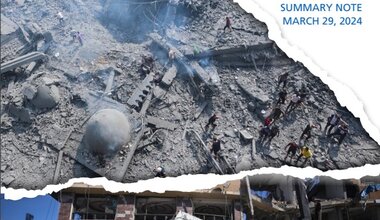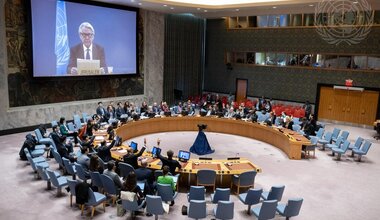Security Council Briefing on the Situation in the Middle East, including the Palestinian Question [As Delivered by Special Coordinator Tor Wennesland]
Madam President,
Members of the Security Council,
We are witnessing a surge in violence, including some of the deadliest incidents in nearly twenty years.
I am concerned that developments on the ground are continuing their negative trajectory, gaining in both pace and intensity.
At the same time, unilateral actions are moving the parties still further apart, exacerbating tensions and driving the conflict.
Immediate efforts are required to reduce tensions. But restoring calm is not, on its own, a recipe for progress.
The UN, along with regional and international partners, have engaged intensively with all parties to de-escalate the situation.
In particular, I appreciate your efforts in the Council to focus attention on the situation here as reflected in the Statement from the President.
I call upon the parties to match security efforts with political steps that can halt the negative slide and restore hope in an end to the conflict and prospects for a viable two-State Solution.
Madam President,
Since I last briefed this Council, we have seen an alarming number of fatalities. Forty Palestinians, including one woman and seven children, have been killed in the occupied West Bank. In the same period, ten Israelis, including one woman, three children and one security personnel, as well as one female foreign national have been killed.
A significant number of Palestinian casualties have occurred in the context of Israeli security forces (ISF) search and arrest operations and clashes with armed Palestinians, including in Area A of the occupied West Bank.
On 26 January, ten Palestinians, including militants and a 61-year-old woman, were killed in the Jenin Refugee Camp. A few days later, on 30 January, ISF killed five armed Palestinians during an arrest operation that led to an exchange of fire in the Aqbat Jabr refugee camp, near Jericho. Those killed were later claimed by Hamas as members of its armed wing.
Two terrorist attacks were carried out in occupied East Jerusalem. Six Israelis, including a child, and one foreign national were killed in a shooting attack perpetrated by a Palestinian outside a synagogue on 27 January; and three Israelis, including two children, were killed in a ramming attack on 10 February.
Two Palestinians were killed by settlers in the occupied West Bank, one while attempting to carry out a stabbing attack on 21 January, and one shot in a confrontation with a group of settlers near a Palestinian village on 11 February.
On 13 February, a Palestinian boy stabbed an ISF personnel in East Jerusalem, during which a second ISF personnel was shot and killed in a friendly-fire incident.
As the Secretary-General noted last month, the current escalation of violence is deeply worrying. There can never be any excuse for acts of terrorism and targeting of civilians, which must be clearly condemned and rejected by all. Celebration or glorification of such attacks is abhorrent and must be unequivocally condemned.
I reiterate that perpetrators of all acts of violence must be held accountable and swiftly brought to justice. Security forces must exercise maximum restraint and use lethal force only when strictly unavoidable to protect life.
I am particularly appalled that children continue to be the victims of violence and involved in violent incidents. Children must never be the targets of violence, used or put in harm’s way.
Madam President,
Amid the mounting violence, there was also a concerning deterioration in relations between Israel and the Palestinian Authority.
Following the 26 January Israeli search and arrest operation in Jenin, the Palestinian Authority (PA) announced that security coordination with Israel “no longer exists.”
Following the 27 January terrorist attack in Jerusalem, the Israeli Security Cabinet announced a series of measures, including steps to reinforce security, strengthen Israeli settlements, and punitive measures against the perpetrators of the attacks in Jerusalem and their families.
On 2 February, Israel’s Finance Minister announced an increase in monthly deductions from clearance revenues that Israel collects on behalf of the PA. The deductions – carried out in line with an Israeli law mandating the Government to withhold the equivalent of what it says the PA pays to Palestinian perpetrators of attacks against Israelis or to their families – would double from approximately 15 to 30 million USD per month.
In light of these deductions, the PA said it expected to maintain and potentially increase measures such as paying partial salaries for PA employees, which will severely impact health, education and social support services.
The financial implications of these various factors clearly contribute to undermining the stability of the PA.
Madam President,
Significant decisions were announced by the Israeli Government related to settlement advancements and settlement outposts.
On 12 February, the Israeli Security Cabinet announced that it had decided to authorize nine illegal outposts in the occupied West Bank. It also said that the Civil Administration’s Higher Planning Committee would convene in the coming days to advance housing units in settlements, and that Police and Border Police units in Jerusalem would be reinforced and their operations expanded.
Such outposts increase the settlement footprint and create friction points in the occupied West Bank. The announcement was met with widespread opposition from the Palestinian Authority and members of the international community. Many emphasized that such unilateral moves exacerbate tensions and undermine prospects for a negotiated two-State Solution.
Israeli settlements, including outposts, are illegal under international law and remain a substantial obstacle to peace.
Demolitions and seizures of Palestinian-owned property also remain a serious concern. During the reporting period, Israeli authorities demolished, seized or forced owners to demolish 52 Palestinian-owned structures in Areas B and C and 46 in occupied East Jerusalem, displacing 130 Palestinians, including 68 children. The demolitions were carried out due to the lack of Israeli-issued building permits, which are nearly impossible for Palestinians to obtain.
On 7 February, Israel’s High Court of Justice instructed the Government to submit by 2 April its response to a petition seeking to force implementation of standing demolition orders against the Bedouin village of Khan al Ahmar. The Government had requested a postponement until 1 June.
Also on 7 February, Israeli authorities said they would postpone the demolition of a multi-story structure housing some 100 Palestinians in the East Jerusalem neighborhood of Silwan. The postponement came a day after the police had told residents they would move forward with the demolition.
I am concerned by the significant increase in demolitions, particularly in East Jerusalem. I urge Israel to cease this practice in line with its obligations under international humanitarian law.
Madam President,
Turning to Gaza, the relative calm of the past few months was interrupted by exchanges of fire during the reporting period, once again demonstrating the fragility of the ceasefire.
Palestinian militants in Gaza fired rockets from the Strip towards Israel on six occasions. A total of 11 rockets were fired, of which five were intercepted by the Iron Dome system, two landed in open areas and one fell short in Gaza.
In retaliation, ISF carried out airstrikes on 14 occasions against what it said were Hamas militant targets in the Strip, causing damage.
I reiterate that the indiscriminate launching of rockets towards Israeli population centers violates international law and must stop immediately.
Madam President,
The United Nations continued to deliver vital humanitarian and development assistance to Palestinians in Gaza and remains engaged with all parties to reduce access restrictions to support the Gaza economy and basic service delivery.
Increasing the movement of goods, in particular between Gaza and the West Bank, is vital for the Gaza economy to grow and generate employment opportunities. Such linkages can help sustain a vision for a political solution to Gaza’s challenges.
Madam President,
I welcome the important regional and international diplomatic efforts during the reporting period aimed at avoiding a deterioration on the ground.
In January, U.S. Secretary of State Antony Blinken visited Israel and the Occupied Palestinian Territory, meeting with Israeli and Palestinian leaders in an effort to advance concrete steps by both parties “to lower the temperature, to foster greater cooperation, to bolster people’s security.”
The visit coincided with a visit by senior officials from Egypt and Jordan, who met together with President Abbas on 31 January.
Madam President,
Turning to the region, on the Golan, the ceasefire between Israel and Syria has been generally maintained despite continued violations by both parties of the 1974 Agreement on Disengagement of Forces. The Israel Defense Forces on 28 January fired at two individuals from the Bravo side in the vicinity of the ceasefire line, injuring one, who later succumbed to his injuries.
In Lebanon, the situation along the Blue Line remained mostly calm. UNIFIL interposed between the Israel Defense Forces and the Lebanese Armed Forces on 18 and 19 January near Sarda and on 23 and 24 January near Markaba in connection with vegetation clearing works by the Israel Defense Forces.
Madam President,
We have seen ominous signs of what awaits if we fail to address the current instability. Preventing more violence is an urgent priority, which requires not only coordinated security measures, but also considerable political efforts. As such, I urge both sides to avoid unilateral steps that could further inflame the situation.
I reiterate my appeal to the parties to rein in violence and incitement and hold perpetrators accountable. In particular, there is a need to address instability in the West Bank, characterized by spiraling tensions between ISF and armed Palestinian factions and friction points between settlers and Palestinians, which drives more violence and emboldens extremists. Restoring security coordination and ensuring the Palestinian Security Forces can operate effectively is key. At the same time, I urge a halt to all settlement expansion, as well as demolitions and evictions, which fuel these tensions.
With the holy month of Ramadan once again coinciding with the Passover and Easter holidays this year, joint efforts are needed to ensure that this period passes safely and peacefully for all. Provocations, disinformation and efforts by extremists to stoke violence must be addressed swiftly and effectively.
In this context, I reiterate the Secretary-General’s call for all parties to refrain from steps that could escalate tensions in and around the Holy Sites, and for all to uphold the status quo, in line with the special role of the Hashemite Kingdom of Jordan.
As we continue to work with the parties and with regional and international partners to calm tensions, we must identify and pursue every opportunity to advance our long-term goal: an end to the occupation and the establishment of two States, living side-by-side in peace and security, on the basis of the 1967 lines, in line with UN resolutions, international law and previous agreements.
Thank you.
 UN
UN
![On screen, UN Special Coordinator for the Middle East Peace Process, Tor Wennesland briefs the Security Council on the Situation in the Middle East, including the Palestinian Question [UN Photo/Loey Felipe - 19 January 2022]](https://unsco.unmissions.org/sites/default/files/styles/full_width_image/public/field/image/special_coordinator_wennesland_-_19_jan_2022_-_un_photo_loey_felipe_1.jpg?itok=JWKOOlBl)




